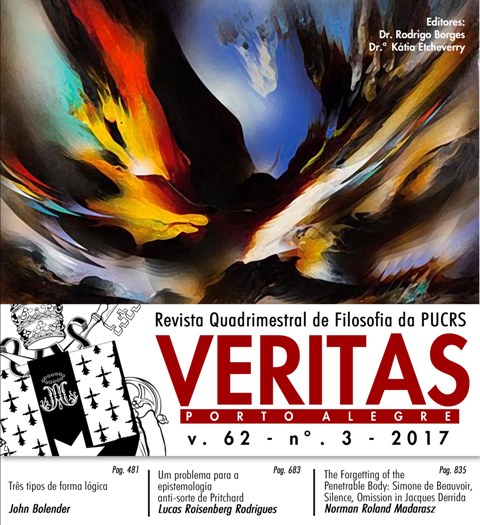Democratic politics between institutionalization and spontaneity: some notes from Habermas’ theory of modernity
DOI:
https://doi.org/10.15448/1984-6746.2017.3.20255Keywords:
Habermas, Western Modernization, Politics, Social Systems, Social Classes.Abstract
In this paper, I criticize the methodological-programmatic strategy of Habermas’ theory of modernity and its consequent juridical-political procedural paradigm in terms of using the correlation of systems theory and normative theory as basis for the understanding-framing of the Western modernization, which leads to a double problem: first, to the fact that social systems are technical-logical structures with a self-referential, self-subsisting, autonomous and closed dynamic regarding lifeworld, characterized basically by instrumental rationality and streamlined from a procedure which is exclusively internal to the own social systems, which means that they are non-political and non-normative structures and subjects, so that the possibility of a direct political-normative intervention by civil society’s political subjects into de social systems is deleted; second, the utilization of both this notion of institution or social system (as technical-logical, non-political and non-normative structure-subject with a self-referential and self-subsisting dynamic of functioning and legitimation) and of the concept of complex society as defining the contemporary democratic societies which (a) are constituted by this kind of social system, (b) do not have already a political-institutional center from which social evolution is streamlined, and (c) are marked by the anonymity and individualization of the political subjects. As consequence, it is forged a form of juridical-political proceduralism that, on the one side, is impartial, neutral, formal and impersonal in relation to social classes and class struggles, depoliticizing institutions and their internal dynamic, as the own social classes, their struggles and counterpoints for hegemony, as well as, on the other side, it is blocked by that technical-logical character of the social systems, which brakes and weakens democratic political praxis in relation to social systems in general and to juridical-political institutions in particular. Here, the strong institutionalism becomes the central basis-subject of societal-institutional constitution, legitimation and evolution.Downloads
References
HABERMAS, Jürgen. Teoria do agir comunicativo (Vol. I): racionalidade da ação e racionalização social. Tradução de Paulo Astor Soethe. São Paulo: Martins Fontes, 2012.
________________. Teoria do agir comunicativo (Vol. II): sobre a crítica da razão funcionalista. Tradução de Flávio Beno Siebeneichler. São Paulo: Martins Fontes, 2012.
________________. Direito e democracia (Vol. I): entre facticidade e validade. Tradução de Flávio Beno Siebeneichler. Rio de Janeiro: Tempo Brasileiro, 2003.
________________. Direito e democracia (Vol. II): entre facticidade e validade. Tradução de Flávio Beno Siebeneichler. Rio de Janeiro: Tempo Brasileiro, 2003.
_______________. O discurso filosófico da modernidade: doze lições. Tradução de Luis Sérgio Repa e de Rodnei Nascimento. São Paulo: Martins Fontes, 2002.
_______________. Ensayos políticos. Traducción de Ramón Garcia Cotarelo. Barcelona: Ediciones Península, 1997.
NOBRE, Marcos. Imobilismo em movimento: da abertura democrática ao governo Dilma. São Paulo: Companhia das Letras, 2013.
RANCIÈRE, Jacques. O ódio à democracia. Tradução de Mariana Echalar. São Paulo: Boitempo, 2014.
SINGER, André. Os sentidos do lulismo: reforma gradual e pacto conservador. São Paulo: Companhia das Letras, 2012.
Downloads
Published
How to Cite
Issue
Section
License
Copyright
The submission of originals to Revista Veritas implies the transfer by the authors of the right for publication. Authors retain copyright and grant the journal right of first publication. If the authors wish to include the same data into another publication, they must cite Revista Veritas as the site of original publication.
Creative Commons License
Except where otherwise specified, material published in this journal is licensed under a Creative Commons Attribution 4.0 International license, which allows unrestricted use, distribution and reproduction in any medium, provided the original publication is correctly cited. Copyright: © 2006-2020 EDIPUCRS</p






